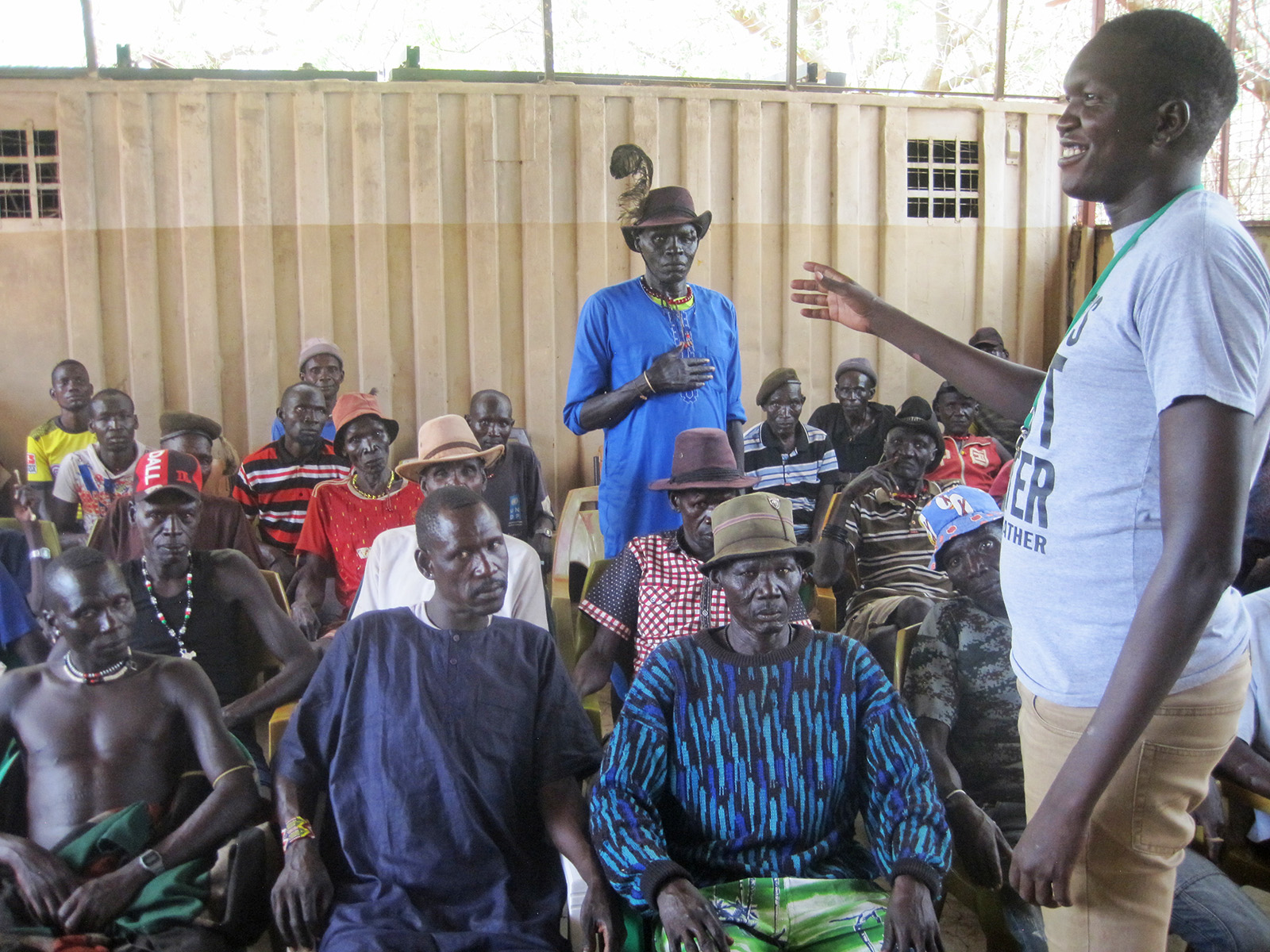
Lokii Eliah (right) facilitates the trauma healing workshop at Kuron Peace Village.
Lord, my God, I called to you for help, and you healed me. (Psalm 30:2)
Fifty-seven Toposa elders, youth and women from 10 different villages in the Kuron area recently attended a trauma healing workshop facilitated by Kuron Peace Village’s peace department.
No one knew what to expect, as this was the first time we held such a workshop. However, the Toposa were very engaged and active during this day-long workshop. Most were eager to share their stories of pain and suffering, which have led to their trauma. Even while eating on break between sessions, people continued sharing and talking about their personal stories.
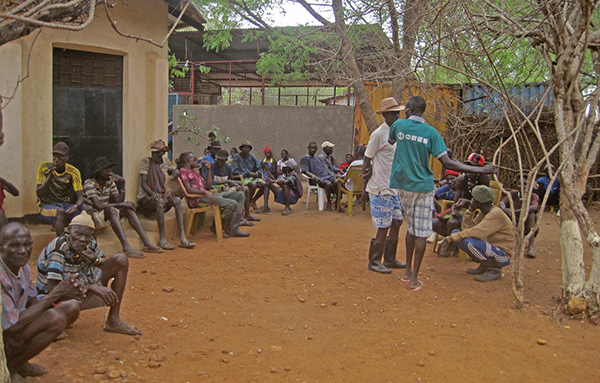
People continued to discuss their stories and trauma from the past even during breaks.
Several techniques were introduced to the participants for stress relief and anger management. Role plays were also used to encourage team work, community building, thinking together and working on solutions together. Other techniques included massage pressure points and talking to an object if you are angry — and not the person — to release your initial anger. Breathing exercises with eyes closed made some of the participants so relaxed they almost fell off their chairs for falling asleep!
STORIES
Although Toposa people are normally reticent and not so willing to talk about their internal struggles, the trauma healing workshop seemed to strike a chord and many were eager to share their pain. During the course of the day, more and more people wanted to talk about the problems inside their families. Women contributed as much as men.
- One man recounted a time in his youth when he was coerced into going on a cattle raid. They knew the Didinga had good sharp shooters, and everyone was a bit afraid. In the end, the Toposa attacked the Didinga. As it turned out the Didinga caught them in a very difficult place. The Toposa were ambushed in a river bed and couldn’t get out due to steep banks. The Didinga were killing them like ducks in a pond. At least 20 of the Toposa were killed. Somehow, this man was able to crawl out and escape. However, from that time onward he couldn’t stop the nightmares. He related how he would be collecting fruit by a river and suddenly he would get shivers and shakes. He promised not to ever go there again. He continues to live with this trauma.
– - Another woman told a story from 2008, when she was young. She was alone, cooking in the kitchen in the peace village compound guest house, when two men entered. They were traders from Katanya and wanted to abduct and then rape her. She still remembers, and when meeting these people later, she would begin shaking uncontrollably. She avoided them as much as possible. Much later these men realized what they had done was wrong, and they actually apologized. The two men were at the trauma healing session and verified her story. Now they are friends, and there are no more hostilities.
– - Another woman shared a story from last year in Napil village. She had a fight with her husband. He was abusing her parents and told her to get out and return to her village. He beat her. She fears him to this day. He left her for over three months and wouldn’t talk to her. She was in a dilemma. Then the husband spoke with a member of the Napil village who served as a sort of mediator. He tried his best but still couldn’t resolve the man’s issues with his wife. So this issue is still outstanding.
– - Another man was traumatized by the Kuron River. At that time there was no bridge. A group of Toposa were on a cattle raid and tried to cross the swollen river. He somehow fell into the swirling and rushing water. He was quickly carried away from them. He fought for his life going under many times. About four or five kilometers downstream, he was miraculously pushed to shore. His friends came running but they thought for sure he was dead. They saw it as a miracle that he survived. However, to this day the man will not go near large bodies of water.
– - Another man was in a vehicle which tried to cross a river. He was able to escape and get to safety, but his friend in the vehicle with him drowned. He had to watch helplessly. He can’t forget this experience and has tremors when crossing rivers.
– - One man admitted that he beat his wife. After some time and reflection, he regretted it. He said most Toposa men slowly come to their senses. He just started talking to his wife, and now they have reconciled. The women agreed that when their husband talks to them that is like an apology. Even if they just tell them to get food ready or make their bed. This is the Toposa way to forgive. Even if the man’s words are harsh, just the fact he is talking with his wife shows he is reconciled.
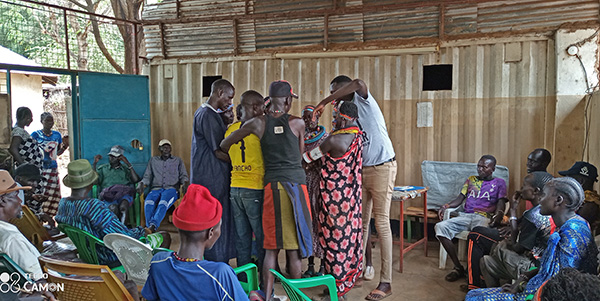
Role play and games were part of the trauma healing workshop.
To be sure, there were also lighter moments. When one of the women commented that when a husband and wife have sex, “All the angers and trauma are gone. It is a good medicine and relieves the tension.” This brought a big laugh to the group as many participants agreed with this.
IMPACTS
It will take time to see any long-term impact. As this was the first time to present such a workshop, peace village staff are not sure what changes might have occurred communally and individually.
Several of the participants expressed satisfaction with this workshop. For some it was the first time they had talked about their trauma. For others it was a release and relief to be able to share. Most of the participants were so enjoying this that during tea break, lunch and the walk home they were heard discussing so many issues of trauma in their lives.
CHALLENGES
- Many of the concepts around healing trauma are new to the Toposa people. They need time to think about the ideas and issues brought up. The facilitator needs to be very sensitive to the people.
- Time is limited, yet Toposa prefer to allow everyone to speak. There has to be a balance, which is not easy.
- There is a need for more such workshops, but at the moment there is no budget for trauma healing workshops.
LESSONS LEARNED
- As the healing process touches upon sensitive cultural and traditional beliefs and customs, it is best to have a Toposa facilitator who is aware of the nuances of the people.
- The time to hold such trauma healing workshops is when there is not so much work to do in the fields. This way the participants are more relaxed and have more time.
- It is best to have a flexible schedule for the workshop so that if the participants move in a certain direction there is time to allow more interchanges and exchanges.
- Toposa say that time can heal. No one can do it for you. The Toposa language doesn’t use the word “sorry.” Forgiveness is done differently in Toposa culture.
This story is based on interviews with Toposa elders and with the two peace department facilitators of the workshop, Lokii Eliah and Peter John.

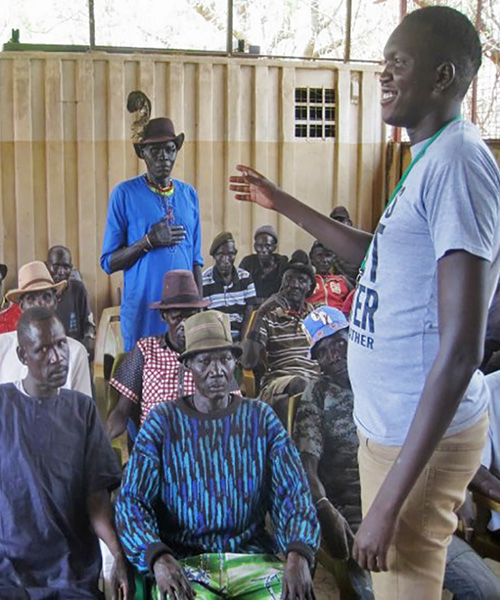

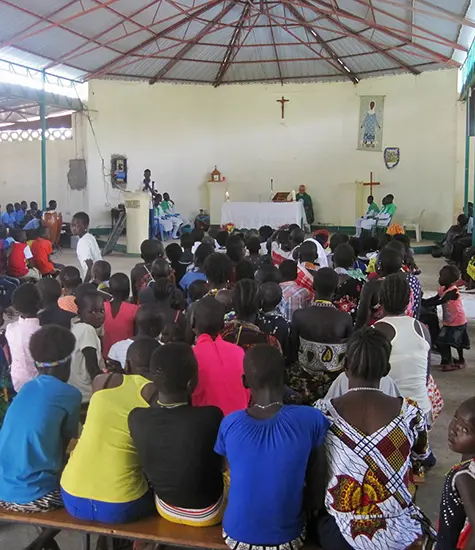
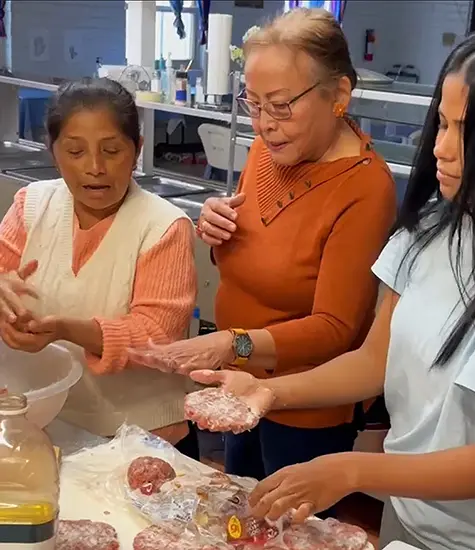
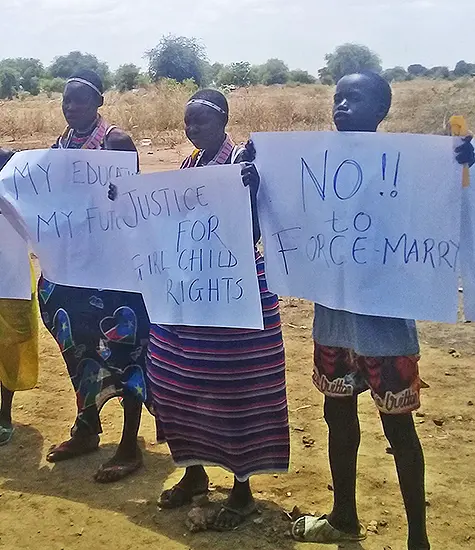




Fascinating recount of the healing workshop. Continue your good work.
So glad to hear that trauma work and interventions are reaching the Kuron area. Trauma affects so many people and everyone should have access to trauma-informed interventions. Thank you for what you do.
Very insightful! Keep up the good work – it may take generations to heal the trauma of South Sudan but every bit of the effort is worth it.
Hi Gabe, This is a much needed workshop in South Sudan. Thankfully you are out in country doing this type of workshop. It is this type of workshop that will start the light of forgiveness and trust that South Sudan needs. I am in Juba and will be here till May 12, arrived March 29. While Juba is much more crowded than 2018- 19 when I was here, the same hostilities remain. Thank you for your work.
Barbara Bowden